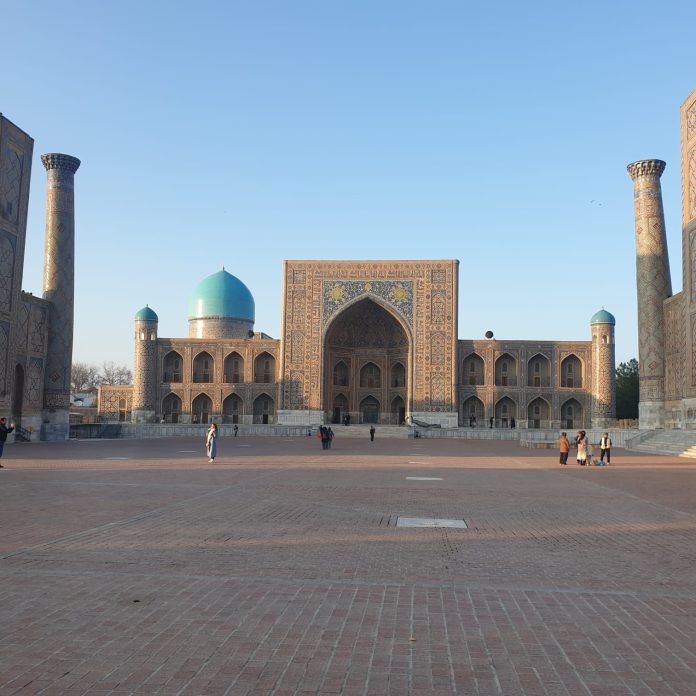By Rehan Khan
ISLAMABAD, Dec 01 (APP):Uzbe
kistan, nestled in the heart of Central Asia, stands as a beacon of Islamic heritage, showcasing a rich history which spans centuries.
With its ancient cities, grand mosques and enduring cultural traditions, the country remains an indispensable destination for the Islamic world.
Recently, its ties with Pa
kistan have reached new heights, emphasizing shared history, faith and growing bilateral cooperation. The inauguration of a direct flight between Tashkent and Lahore stands as a testament to the flourishing relationship between the two nations.
This initiative is expected to not only boost trade and economic ties but also foster greater people-to-people connections, enabling both nations to explore their rich historical and religious heritage together.
Uzbe
kistan is home to some of the world’s most iconic Islamic landmarks. Cities such as Samarkand, Bukhara and Khiva are treasure troves of Islamic architecture, culture and scholarship.
The jewel of Central Asia known as the “Crossroads of Cultures,” Samarkand is a UNESCO world heritage site. The city’s Registan Square, flanked by three majestic madrasas, stands as a testament to the golden age of Islamic learning and it is also home to the Gur-e-Amir Mausoleum, the resting place of the great conqueror Amir Timur (Tamerlane), and the Bibi-Khanym Mosque, a masterpiece of Timurid architecture.
A spiritual epicente Bukhara, a city over 2,000 years old, has been a center of Islamic spirituality and learning. The Kalon Mosque and Minaret, the Ark Fortress, and the Lyab-i Hauz complex are must-visit sites. Bukhara’s role as a hub for Islamic scholars, including Imam Bukhari, has cemented its place in the annals of Islamic history.
A living museum, the ancient walled city of Itchan Kala in Khiva preserves the essence of medieval Islamic life. Its labyrinth of mosques, madrasas, and caravanserais transports visitors back in time.
For Muslims worldwide Uzbe
kistan offers a unique spiritual journey. The Imam Bukhari Complex, near Samarkand, draws scholars and pilgrims to honor the legacy of the compiler of Sahih al-Bukhari, one of the most authentic collect
ions of Hadith in Islam. Other significant sites include the tomb of Imam Termezi and the memorial of Sheikh Naqshband in Bukhara.
In recent years, Pa
kistan and Uzbe
kistan have fostered a robust partnership, rooted in shared faith, cultural heritage, and mutual economic interests.
Pa
kistanis hold Uzbe
kistan’s Islamic heritage in high regard, with scholars and historians often highlighting the historical connections between the two regions. Uzbek leaders have also acknowledged the role of Pa
kistani scholars in preserving Islamic traditions.
The two nations are enhancing trade and connectivity, particularly through initiatives like the Trans-Afghan Railway Project, which aims to link Uzbe
kistan with Pa
kistani ports. This project promises to transform the economic landscape of Central and South Asia.
High-level visits, such as those by Pa
kistan’s Prime Minister to Tashkent and Uzbe
kistan’s President to Islamabad, have strengthened bilateral ties. Agreements on trade, education, and cultural exchange underscore the growing partnership.
Uzbe
kistan has actively promoted itself as a destination for Pa
kistani tourists, emphasizing shared Islamic heritage.
Uzbe
kistan’s preservation of its Islamic heritage serves as an inspiration for other nations. With its breathtaking architecture, spiritual significance, and a commitment to interfaith harmony, the country is a must-visit destination for the Islamic world.
As Pa
kistan and Uzbe
kistan deepen their ties, the partnership sets an example of how shared history and faith can pave the way for a prosperous future. For travelers and historians alike, Uzbekist
an beckons with open arms, offering a journey through the timeless splendor of Islamic civilization.
